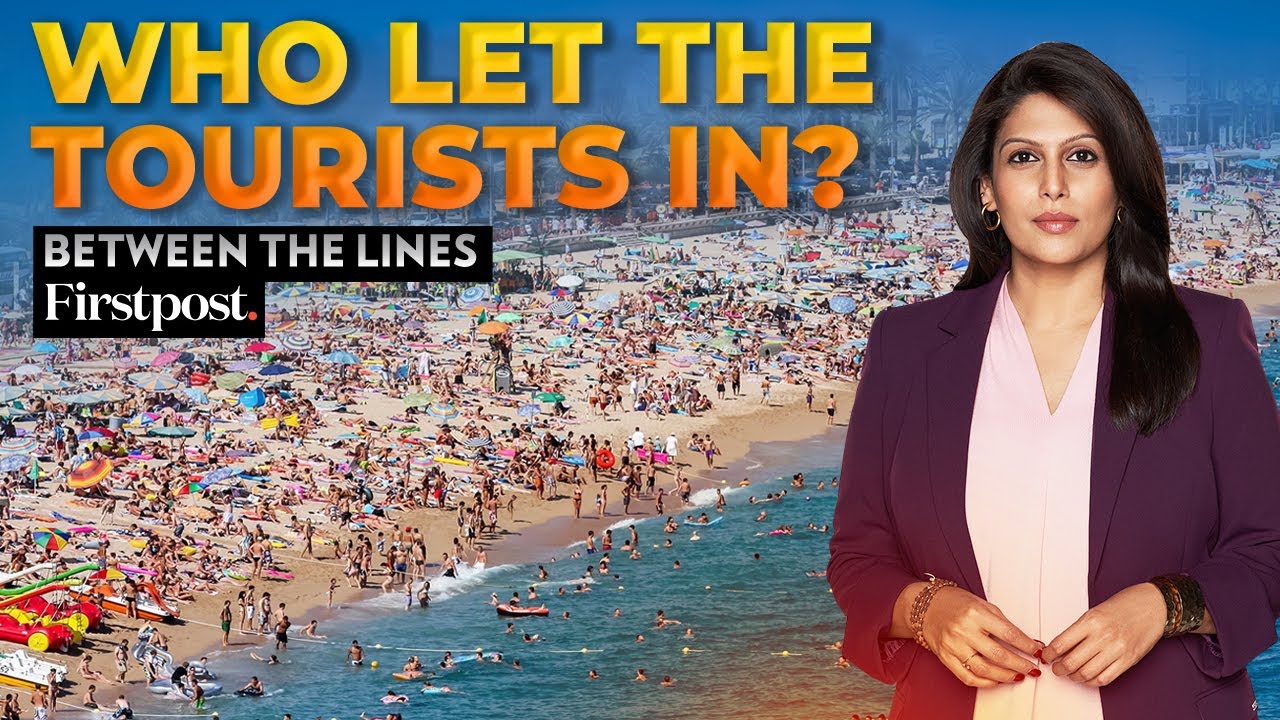Crowded Out: The Story of Overtourism
Summary
TLDRThe video discusses the growing global issue of 'over-tourism,' where the excessive number of visitors to popular destinations negatively impacts local communities, environments, and cultures. It highlights how tourism, once seen as beneficial, now causes overcrowding, rising living costs, environmental damage, and a loss of authenticity in cities like Venice and Barcelona. Experts and residents express concerns about the unsustainable growth of tourism, urging for better management to protect cultural heritage and natural sites. The video calls for a balance between tourism and the preservation of local communities and environments.
Takeaways
- 🌐 **Overtourism Defined**: Overtourism is a situation where locals and tourists alike feel that a place has been overvisited, leading to a loss of authenticity for tourists and irritation for locals.
- 🏙️ **Impact on Locals**: Overtourism has led to increased cost of living, property price inflation, and displacement of locals from their neighborhoods due to short-term rentals.
- 🌍 **Global Phenomenon**: Overtourism is not limited to popular cities but also affects remote and fragile locations, causing environmental damage and local tensions.
- 📈 **Exponential Growth**: The tourism industry has grown exponentially, with a significant increase in tourist arrivals worldwide from 25 million in 1950 to 1.3 billion in 2017.
- ✈️ **Role of Low-Cost Airlines**: The rise of low-cost airlines has made travel more accessible, contributing to the surge in tourist numbers and the problem of overtourism.
- 🏖️ **Environmental Concerns**: Overtourism has led to environmental degradation, with increased waste and strain on natural resources in popular tourist destinations.
- 📰 **Media Influence**: Media often promotes the same destinations, leading to concentrated tourist flows and contributing to the problem of overtourism.
- 🚢 **Cruise Ship Issues**: Cruise ships are a significant source of environmental damage and contribute to 'fly-by' tourism, which adds little value to local economies.
- 🌆 **Urban Challenges**: Cities like Barcelona have been overwhelmed by the impact of overtourism, with local markets becoming tourist attractions and losing their authentic cultural value.
- 🏠 **Housing Crisis**: The surge in tourism has led to a housing crisis in many cities, with locals unable to find affordable housing due to the conversion of residences into short-term rentals.
Q & A
What significant change occurred in the tourism industry in 2017?
-In 2017, the concept of 'over tourism' emerged as a significant issue, with protests against mass tourism in Spain and other locations, highlighting the negative impacts of tourism on local communities and environments.
What does the term 'over tourism' imply?
-Over tourism refers to a situation where either local people or tourists feel that a place is over visited, causing a loss of authenticity for tourists and irritation for locals, ultimately changing the character of the visited place.
How did the events of 2017 impact Justin Francis' perspective on tourism?
-The events of 2017 made Justin Francis, who has dedicated his life to travel and running a travel business, realize the negative consequences of over tourism and the need for a more responsible approach to tourism.
What is the main concern of local communities regarding over tourism?
-Local communities are concerned that over tourism is leading to increased cost of living, loss of local culture and identity, and overcrowding, which is making their daily lives unbearable.
What is the impact of over tourism on the city of Venice?
-Over tourism in Venice has led to a loss of local identity, with traditional businesses being replaced by souvenir shops, increased property prices leading to locals moving away, and a general degradation of the community.
How has Barcelona been affected by the rise of mass tourism?
-Barcelona has experienced an increase in protests from locals, a transformation of local markets into tourist attractions, and a shift in local businesses to cater exclusively to tourists, leading to a loss of authentic culture.
What was the outcome of Thomas Eglee's visit to Gili Trawangan Island?
-Thomas Eglee found that Gili Trawangan Island had changed dramatically from a quiet paradise to an overcrowded tourist destination with significant environmental damage, including a hidden rubbish pit.
What are some of the factors contributing to the exponential growth of tourism?
-The rise of low-cost airlines, tax breaks for the aviation sector, media promotion of certain destinations, and an increase in global population and affluence have all contributed to the rapid growth of tourism.
What role do cruise liners play in over tourism?
-Cruise liners contribute to over tourism by causing environmental damage and promoting 'fly by' tourism, which adds little value to local economies and often overwhelms local infrastructure.
What is the estimated number of international tourist arrivals by 2030?
-It is estimated that international tourist arrivals will reach 1.7 billion by 2030, continuing the trend of exponential growth.
What is the call to action for governments regarding tourism management?
-Governments are called upon to accept the responsibility of managing tourism, recognizing there are limits to the number of tourists that can be sustained and implementing strategies to prevent over tourism.
Outlines

このセクションは有料ユーザー限定です。 アクセスするには、アップグレードをお願いします。
今すぐアップグレードMindmap

このセクションは有料ユーザー限定です。 アクセスするには、アップグレードをお願いします。
今すぐアップグレードKeywords

このセクションは有料ユーザー限定です。 アクセスするには、アップグレードをお願いします。
今すぐアップグレードHighlights

このセクションは有料ユーザー限定です。 アクセスするには、アップグレードをお願いします。
今すぐアップグレードTranscripts

このセクションは有料ユーザー限定です。 アクセスするには、アップグレードをお願いします。
今すぐアップグレード関連動画をさらに表示

How top tourist destinations try to overcome overtourism and touristification | DW News

How Overtourism Is Destroying Cities | Between the Lines with Palki Sharma

Espagne-Tourisme : les habitants dénoncent les excès du tourisme

Overtourism: How to be a responsible tourist - The Global Story podcast, BBC World Service

What is behind the rise in anti-tourism protests? | BBC News

Toxic Tourism: The unwelcome impact
5.0 / 5 (0 votes)
